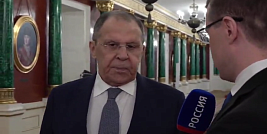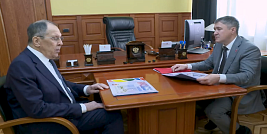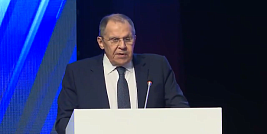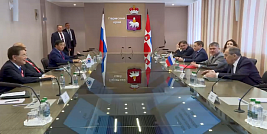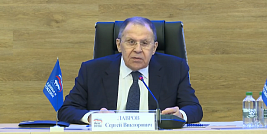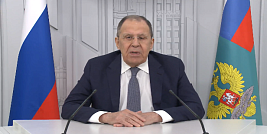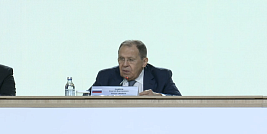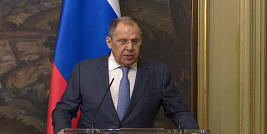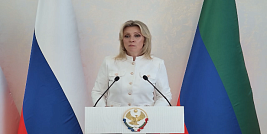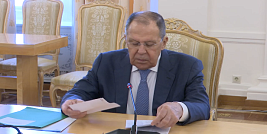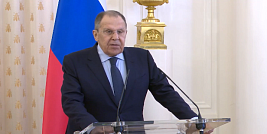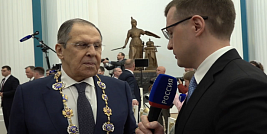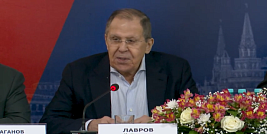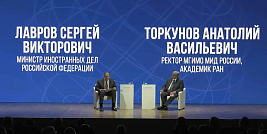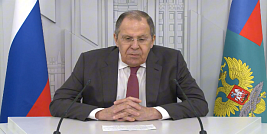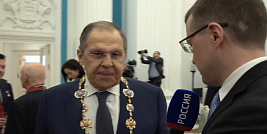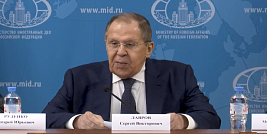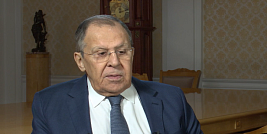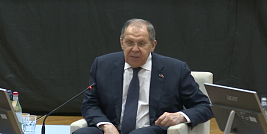Briefing by Foreign Ministry Spokeswoman Maria Zakharova on the sidelines of the Eastern Economic Forum, Vladivostok, September 13, 2023
Table of сontents
- International and interregional ties of Russia’s Far East
- Deputy Prime Minister and Foreign Minister of the Republic of the Union of Myanmar Than Swe’s visit to the Russian Federation
- Sergey Lavrov’s upcoming talks with Foreign Minister of the People’s Republic of China Wang Yi
- Sergey Lavrov’s attendance of the 78th Session of the UN General Assembly
- Foreign Minister Sergey Lavrov’s participation in events of multilateral Asian associations on the sidelines of the 78th UN General Assembly session
- The Ukraine crisis
- European initiative on preservation and development of Ukrainian culture and heritage
- Statements by US Ambassador to the EU
- The double standards of “Hague justice”
- NATO Northern Coasts 2023 exercise
- Regular meeting of the Moscow Format Consultations on Afghanistan
- Niger update
- Amur Autumn open Russian film and theatre festival
- The 50th anniversary of the military coup d’etat in the Republic of Chile
- International Day of Democracy
- The United Mexican States’ national holiday
- Belize’s national holiday
- Russia International Exhibition and Forum
- Estonia’s intention to adopt a law on seizing Russian assets
- Romania’s protest concerning the discovery of drone fragments on its territory
- Alleged presence of Wagner PMC fighters in Armenia
- “Investigation” by the US Congress
- Yerevan’s plans to ratify the ICC Rome Statute
- Russia-North Korea relations
- International symposium on protecting the rights of Japan’s Ainu people
- Japan’s releasing water from Fukushima 1 into the ocean
- Azerbaijani Foreign Ministry’s statements about elections in the new Russian regions
- The impact of the Nagorno-Karabakh issue on Russia-Armenia relations
- Russia’s participation in the UN General Assembly High Level week
- Speculations by US media
- Russian journalists denied access to the French President’s news conference at the G20 summit
- Moldovan authorities’ decision to deport the director of Sputnik Moldova
- Maia Sandu regime’s policies
- The African Union’s participation in the G20
- Western countries’ approach to the conflict in Ukraine
- The talks between the leaders of Russia and North Korea
- The report by Xinhua Institute
- The military hegemony of the United States
- Russia’s humanitarian aid for the residents of Nagorno-Karabakh
- NATO’s activity in the South Caucasus
- Armenia-US military exercise
- Russian peacekeepers’ role in the Nagorno-Karabakh settlement
- Russia-North Korea relations
- Russia-Vietnam relations
- Turkiye’s stance on the Armenia-Azerbaijan conflict
- The Spokeswoman’s personal impression of the G20 summit
- Inadmissibility of using nuclear weapons
- Cooperation with the International Russophile Movement
International and interregional ties of Russia’s Far East
Vladivostok is a unique metropolitan area. I am not making this statement for the local journalists. However, since the briefing materials are read by international audiences, I would like to emphasise this once again as the final and concluding message from the forum. This material will be translated into different languages and distributed worldwide through our diplomatic missions. So, Vladivostok is a unique metropolitan area where Eastern and Western cultures come together. It serves as Russia’s crucial economic, financial, banking, trade, and tourism centre and is also our country’s easternmost port. In recent years, Vladivostok has become a popular venue for international economic forums and summits, including the Eastern Economic Forum, on the sidelines of which this briefing is taking place.
Vladivostok has many qualities beyond the ones that I mentioned that are of interest to business people and financial operators. It boasts numerous breathtaking attractions and is blessed with beautiful and unique nature making it an attractive destination for tourism.
The Russian Far East is a unique part of Russia's territory. This macro-region has access to two oceans: the Pacific and the Arctic, and shares borders with five countries (China, North Korea, Mongolia, the United States, and Japan).
The Far Eastern regions are spread across four time zones and different climate zones, ranging from Arctic deserts to subtropics. The region's area amounts to almost 7 million sq km which is nearly 41 percent of Russia's total land area.
The Russian Far East is the largest federal district in terms of size, comprising 11 regions of our country. It has been dynamically developing in recent years, which President Putin mentioned yesterday as he was issuing instructions. Over the past decade, 75 federal laws and 442 government resolutions have been adopted to promote its development and support. This has led to the creation of the priority development areas (PDA), such as the Far Eastern Hectare, the free port of Vladivostok, a special administrative district on Russky Island, the Unified Far Eastern Airline, and the much-envied Far Eastern Mortgage Programme among numerous other projects.
I would like to emphasise that unique mechanisms, such as the PDAs, have been developed to create the most attractive investment climate. The development of the PDA idea has led to the establishment of the Free Port of Vladivostok. Investment projects by the PDA residents aimed at the efficient development of the macro-region receive infrastructure support from the state.
The Russian Far East is rich in natural resources. It accounts for 98 percent of Russian diamond production, 80 percent of tin, 90 percent of boron raw materials, 50 percent of gold, 14 percent of tungsten, and 40 percent of fish and seafood. The region holds about one-third of Russia's coal reserves and hydrotechnical resources. Forested areas account for approximately 30 percent of Russia’s total forested area.
The Russian Far East is at the forefront of developing relations with the Asia-Pacific countries that enjoy sovereignty and can independently determine their own future. Amid the dismantling of bilateral cooperation with Japan to please the West, trade with China, India, and several countries in Central and Southeast Asia is experiencing explosive growth. In fact, Japan followed the example of the EU under pressure from the United States and isolated itself from the natural, centuries-old economic, trade, and financial ties in this region. There are substantial achievements in contacts with Mongolia and the Democratic People's Republic of Korea. A summit is currently taking place in these very hours and minutes.
The Foreign Ministry offices in the regions are actively working towards this end.
The statistics show that there is development and good prospects beyond the self-appointed backwater club of sanctions lovers. That is despite the threats that none of that would happen. Foreign trade between the Far Eastern regions and their foreign partners has grown by 14 percent in terms of freight and by 11 percent in monetary terms in the first eight months of 2023. Nearly 2.9 trillion rubles have been invested in the PDAs and the Free Port of Vladivostok, with foreign capital accounting for 340 billion rubles. It is important to note that the bulk of this investment is coming from private companies, which are primarily profit-oriented meaning that they see significant opportunities in the region. No ideology of intimidation convinced them otherwise.
They are right. The Russian Far East is unique in its role as a link between the world of Europe and the world of Asia, and this is the future that many have predicted. It is now becoming a reality.
We are delighted that the Forum was a success. I know that it is still ongoing, but it is clear that the results are in. I believe they will be further summarised. It was an engaging, productive, and effective forum.
On September 13-15, 2023, Deputy Prime Minister and Minister of Foreign Affairs of the Republic of the Union of Myanmar Than Swe will pay a working visit to the city of Moscow, Russia. On September 14, he is to hold talks with Foreign Minister Sergey Lavrov.
The sides are to discuss the current state of the entire range of bilateral ties and prospects for expanding them, including political dialogue, trade and economic cooperation, collaboration in the field of defence and security, as well as cultural and humanitarian contacts. They will also review topical issues of the regional and international agenda.
Sergey Lavrov’s upcoming talks with Foreign Minister of the People’s Republic of China Wang Yi
On September 18, Foreign Minister Sergey Lavrov will hold talks with Minister of Foreign Affairs of the People’s Republic of China Wang Yi in Moscow.
There are plans to discuss a wide range of bilateral cooperation issues, including top-level and high-level contacts. The sides will focus on efforts to strengthen collaboration on the international scene, while prioritising joint work at the UN, BRICS, the SCO, the G20, APEC and other mechanisms and forums.
There will be a detailed exchange of views on issues related to a settlement in Ukraine, as well as ways of ensuring stability and security in the Asia-Pacific region.
Sergey Lavrov’s attendance of the 78th Session of the UN General Assembly
As you may know, the 78th Session of the UN General Assembly got under way on September 5, 2023.The Russian delegation is led by Foreign Minister Sergey Lavrov. His working schedule at the UNGA High-Level Week in New York to be held from September 19 to 26 is packed and constantly added to. I will only describe the schedule’s fundamental approaches and elements. We will certainly provide additional information as it takes shape.
During this period, Sergey Lavrov will attend a number of multilateral events, including those sponsored by the UN Security Council, BRICS, CSTO, and the Group of Friends in Defence of the UN Charter. Apart from that, he intends to hold about twenty bilateral (the isolation is tough on us: there are increasingly more meetings and talks) meetings with colleagues from different countries and heads of international organisations. His conversation with UN Secretary-General Antonio Guterres has been scheduled as well.
The highlight of Sergey Lavrov’s visit to New York will be his remarks in the course of the general political discussion at the UN General Assembly on September 23. The minister will present Russia’s principled approaches to the most important global challenges, including the further development of the system of international relations with an eye to establishing a truly just multipolar world order based on the aims and principles of the UN Charter in their entirety and on other fundamental international legal standards.
We have repeatedly related the approaches enshrined in the revised Foreign Policy Concept of the Russian Federation adopted in March of this year. We will insist on restoring the role of the United Nations as the central coordinating mechanism for ensuring and harmonising the interests of all states. We will also work to preserve the UN’s intergovernmental nature and provide for strict and meticulous compliance with its Charter. We think that it is unacceptable to replace the generally accepted international legal standards and principles enshrined in the Charter, including the sovereign right of states and non-interference in their internal affairs, with constructs like the notorious “rules-based order.” As you understand, there is no “order” of this sort at all and nothing of that kind has been put on paper and coordinated. These are certain “concepts” elaborated by a narrow group of countries and imposed on the world community as supposedly universal norms, which they are not. Basically, they are not available for perusal. It’s a chimera. If someone really wants to follow the letter and the spirit of international law, they should simply comply with the UN Charter rather than invent some new words and expressions as a substitute.
Jointly with like-minded partners from among the states of the Global South, the Russian delegation will consistently undertake efforts to establish a truly just and democratic polycentric world order, to not permit the politicisation of various areas of interstate cooperation, and to oppose modern forms of neo-colonialism. One of these is certainly unilateral coercion in the form of illegitimate sanctions that are unashamedly used by Western countries to bring direct pressure to bear on governments pursuing an independent foreign policy. The West introduces these restrictions in disregard of their truly global destructive consequences, including the aggravation of the world food crisis and setbacks in achieving the Sustainable Development Goals. They disrupt logistical chains by banning air services and interfering with normal operations of air companies and their staffs. This is just one instance.
During the session, the Russian delegation, jointly with its partners, will promote a gamut of initiatives on key international subjects. Russia will submit traditional UNGA draft resolutions in several important areas such as strengthening the arms control and non-proliferation architecture, preventing outer space militarisation, drafting universal rules of conduct in the information space, and opposing the glorification of Nazism. We invite all responsible members of the international community to support these and other Russian initiatives and possibly become co-sponsors.
In more detail, Russia’s approaches to issues on the agenda of the 78th Session of the UN General Assembly are reflected in relevant material posted on the Foreign Ministry website.
On September 20-21, Foreign Minister Sergey Lavrov will take part in an extraordinary meeting of the Shanghai Cooperation Organisation’s foreign ministers and a traditional informal Conference on Interaction and Confidence Building Measures in Asia (CICA) ministerial meeting on the sidelines of the 78th UN General Assembly session in New York.
The SCO meeting participants are to discuss issues related to the organisation’s comprehensive improvement and prospects for deepening its collaboration with the UN. They will discuss topical international and regional issues. Iran, which became the ninth SCO member state in July 2023, will take part in the events for the first time.
The agenda of the CICA meeting will focus on implementing decisions to improve the association’s performance, adopted at the 2022 summit in Astana, systematising current areas of cooperation and charting new ones within the CICA framework. There are plans to approve a Russia-initiated statement on developing volunteer programmes, an important element of civil responsibility, in order to strengthen social, cultural and humanitarian connectivity in the CICA region still further.
On September 10, a milestone event took place in the new constituent entities of the Russian Federation, namely, the Donetsk and Lugansk people's republics and the Zaporozhye and Kherson regions. The first elections to local government under Russian law were held. Since martial law is in force in these regions, the voting process focused on ensuring maximum safety for voters. As a result, the voters were able to make their free choice in what was generally a peaceful atmosphere. The turnout exceeded 65 percent in all of the above entities, and in the DPR it was over 76 percent.
What about the Kiev regime? It has once again made desperate attempts to thwart people that it treats as outsiders from expressing their will. I will remind you what Zelensky said (as you are aware) that those who see their future with Russia can pack their bags, go to the train station and leave. Perhaps, he didn't realise that these people would take some land along, which they did. This is the land of their ancestors. The fathers and grandfathers of the people who are now opposing the reincarnation of Nazism and fascism today fought for it, and have been doing so for many years. They did not want to do the Nazi salute to the Kiev regime and to put up with this new reality called “anti-culture” which is the culture of total destruction, and forgetting or rewriting history.
On the night of September 10 (this is how the Kiev regime responded to the people who took part in the voting), in the Zaporozhye Region, the Ukrainian forces used a drone to attack a polling station and completely destroyed it. Fortunately, no one was injured. The heads and members of the election commissions received threats from Ukrainian neo-Nazis. Were Ukrainian neo-Nazis the only ones to threaten the electoral cycle participants? Let me remind you that they were joined by the official capitals of Western countries that issued threats to election observers. They did so directly by imposing sanctions on them, stoplisting them and persecuting them in every possible way. Despite that, the turnout in the new Russian regions was quite massive. Many shared their feelings and emotions with journalists, saying that they finally made it to their homeland, and noted that this was of principled importance to them.
The international observers from Europe, Asia, Africa and Latin America, who were intimidated but not afraid to come, praised the level of organisation of the elections and their compliance with democratic standards. Let me remind you that all of that is taking place amid shelling by the Ukrainian armed forces. But the collective West pretends not to see it.
The Ukrainian militants are using Western weapons to cynically target civilian sites on Russian territory.
On September 7, the Ukrainian forces attacked a high-rise block of flats in Energodar with UAVs. Several more drones were intercepted by radioelectronic warfare systems. Out of sheer luck no one was injured. All of that is unfolding in a city where the Zaporozhye NPP, the largest in Europe, is located. Sadly, the Western masters of the Kiev regime continue to turn a blind eye to such games around the nuclear site. After all, this can lead to disastrous and irreversible consequences for millions of people, including in a number of European countries, and, in general, around the world.
The terrorist attacks by the Kiev regime against Donetsk continue unabated. On September 9, two civilians were killed and four more were wounded as a result of shelling. On September 10, the Ukrainian armed forces delivered a strike on Druzhok kindergarten in the Voroshilovsky district of that city.
On September 5, Ukrainian neo-Nazis shelled the village of Kozinka, Belgorod Region, killing a civilian, wounding a woman and damaging 11 private houses and a vehicle.
The Kiev regime’s crimes are painstakingly documented by Russian law enforcement agencies. The criminals will be held accountable.
Based on the evidence gathered by Russia’s Investigative Committee, Russian courts continue to pass sentences on Ukrainian neo-Nazis who have committed grave crimes against civilians.
Several days ago, three militants of the Armed Forces of Ukraine, I.Taran, O.Lukyanenko and V.Vasilenko, were sentenced to life for killing civilians in Mariupol in March 2022. They killed 20 people, including a little child. Another neo-Nazi V.Lysyura, was sentenced to 27 years in a maximum- security penitentiary. In March 2022, he fired on cars with civilians in Mariupol on orders from his commanders. Three people were killed and one wounded as a result. S.Batynsky, a militant of the Armed Forces of Ukraine, was sentenced to 25 years in a maximum-security penitentiary for raping a female Mariupol resident and killing her husband in April 2022. Neo-Nazi D.Kharchenko was sentenced to 18 years in a maximum-security penitentiary for firing an assault rifle on a civilian in Mariupol in March 2022, as ordered by his commanders. Fortunately, that man managed to escape.
No Ukrainian criminal will be able to evade responsibility. Those who are cold-bloodedly firing on residential areas in Donetsk and other Russian cities will certainly find themselves in the dock, unless they are killed beforehand.
All these cold-blooded murders and abuse of civilians by Ukrainian militants do not prevent the leadership of NATO countries from supplying weapons to the neo-Nazi Kiev regime.
On September 6-7, 2023, US Secretary of State Antony Blinken (who has been championing human rights all his life) paid a two-day visit to Kiev. He visited a cemetery where Ukrainian militants are buried and noted the successful “counteroffensive” of the Armed Forces of Ukraine. It appears that he counted the number of graves and said that everything was proceeding according to the US plan. Antony Blinken promised to provide the Vladimir Zelensky regime with another tranche of military assistance, including depleted uranium munitions for Abrams tanks.
You have probably noted that IAEA Director General Rafael Grossi was asked about the use of depleted uranium munitions. Replying to this question, he said that this did not have substantial radiological consequences, in the context of nuclear safety. Rafael Grossi is certainly right in saying that the use of depleted uranium munitions does not entail considerable radiological consequences from the nuclear safety standpoint. Speaking of nuclear safety, he ought to urge the Kiev regime to stop shelling the territory near the Zaporozhye Nuclear Power Plant. It appears that he did not care about nuclear safety in this particular case.
The problem is that he is not saying everything, while replying to a question about depleted uranium munitions. It is unacceptable to deliberately or inadvertently hush up this issue. I will explain why. Depleted uranium (this substance is called so because a certain component is removed from it) is a heavy metal and is extremely dangerous for the environment in the context of chemical toxicity.
Rafael Grossi is talking about nuclear safety within his competence, but as a person who understands these issues, he should realise that there is also chemical toxicity. Especially when a heavy metal is used in munitions. When they are used, extremely toxic aerosols will be formed. It is a pity that Mr Grossi did not add to his commentary the information that when the armour of a depleted uranium rod is penetrated, it is also heated and can ignite. The depleted uranium shaped charge liner is even worse.
It is possible that all this is because Mr Grossi decided not to go beyond his competence, staying within the framework of nuclear safety. It doesn't work like that. He is an expert and a person who knows what he is being asked. He should have addressed this question to chemists, who would have told about the harmful effects of heavy metals on the environment and human health. This is just to understand what we are talking about here. The maximum single concentration of uranium in the zone of working premises is 0.000015 g/cub m! Besides, the alpha radiation of U238, which is “safe” when acting outside, becomes extremely dangerous when uranium oxide aerosols get inside a person. Up to and including cancer.
I don't believe Grossi doesn’t know this, because they are related things. He has already read and seen the discussion about it. He either deliberately avoided answering the question or pretended to be staying within his competence. That's the work of the devil. The question is obviously about the danger of these depleted uranium shells not only for the current population, but also for the future through contamination of land and soil.
Europeans are also trying to keep up with their overseas suzerain. According to media reports, three months ago, the Ukrainian firm Skyeton started production of unmanned aerial systems in Slovakia. It is expected that the first UAVs will be ready by the end of this year.
The West continues to bet on the escalation of the conflict. Through the neo-Nazi regime in Kiev, it is determined to continue to send thousands of Ukrainians to the slaughter in order to achieve its own selfish goals.
Against this background, we were surprised by the words of the US Secretary of State, Mr Blinken, who said that Ukraine would enter into negotiations if Russia put forward such an initiative. This is casuistry, wordplay, and language that is so utterly vague as to be meaningless.
First, our country has never refused to achieve the goals of the special military operation by political and diplomatic means. As you remember, when the Kiev regime requested those talks, Moscow immediately agreed. We sat down at the negotiating table. The problem was that they withdrew from those negotiations in April 2022, and then they prohibited themselves from talking in September 2022.
Secondly, Washington apparently forgets about this. Nor do they remember who made Kiev terminate the negotiations with Russia in April 2022, or that Kiev actually imposed a legal self-ban on negotiating with the Russian leaders last September, and then put forward what they call a “peace formula” – essentially an ultimatum to our country. This makes such statements by American officials hypocritical at best; they are misinformation and an attempt to find new excuses, whitewash or justify themselves. But this will not work because everyone knows what really happened.
A few days ago, Nataliya Gumenyuk, the spokesperson for the Group South Command of the Ukrainian army, said that “the Crimean Bridge had very little time left” and that the Ukrainian armed forces would “continue its work” – apparently, to finish off the bridge. Is this what she meant? What is there to comment on? That is blatant extremism. I have nothing to add.
The criminal Zelensky regime, mired in blood and infected with raging Russophobia, continues to prove that it excels at terrorist tactics and intends to continue attacking the Crimean Bridge, which is purely civilian infrastructure. These people in Kiev don't think about consequences. They have no time. We would like to remind them that if this happens, there will be a tough response. Those who plot against our country will not escape retribution, no matter where they are.
On September 6, Kiev hosted a “summit” of first ladies (and gentlemen – why not a costume party?). This year’s edition had a highly relevant theme – mental health. In reality though, the people from Bankovaya street used this platform to beg for Western aid and attempt to put pressure on Russia.
Last week, we marked a special date for our country – the 80th anniversary of the liberation of Donbass from Nazi invaders. On August 31, 1943, Soviet troops drove the enemy out of Saur-Mogila, a peak of strategic importance. Artyomovsk was liberated on September 5, and Stalino (now Donetsk) on September 8. I would like to congratulate the residents of Donbass on this date – truly heroic and talented people, who selflessly fought against Nazism during the Great Patriotic War, and are fighting the same kind of fascism today, only in a new wrapper ˗ the Kiev regime. They feel and know that the entire country, the whole of Russia is behind them.
The West continues pumping Ukraine full of weapons and excuse the regime’s crimes, thus compelling Russia to press on with the special military operation until its goals are fully achieved – the demilitarisation and denazification of Ukraine, and the elimination of challenges and threats to Russia's security emanating from that territory.
European initiative on preservation and development of Ukrainian culture and heritage
We have taken note of the European Commission’s recent decision to register a European Citizens’ Initiative, “Preservation and development of Ukrainian culture, education, language, and traditions in EU states”.
Am I missing something here? Are Ukrainians a small indigenous group in one of the EU countries? Is there something we ought to know about this? Probably. This decision comes amid a situation where certain minorities in the Baltic countries, also members of the European Union, have been denied the right to use their native language for years, a language these people learned and the heritage handed down by their parents. Those countries invented terms such as non-citizens or persons with restricted rights for such people and their parents. The Baltic states have been mistreating our compatriots for years and continue to do so – but the European Commission never noticed. And here they are now, concerned about the preservation of Ukrainian culture, language and heritage in the European Union.
The Kiev regime and all those who support it on the ground seem to have failed at the task. The regime spared no effort in its fight against cultural traditions and heritage, demolishing monuments, renaming streets, and introducing new holidays. Now it turns out their traditions need to be preserved in the EU.
The idea behind this initiative is to promote Ukrainian refugees’ integration across the EU. At the same time, according to its sponsors, in the future, the Ukrainian language should become one of the official languages in the European Union. This is yet another example of double standards Brussels uses in addressing ethnic minorities’ rights issues.
In this context, it must be noted that Turkiye, which applied for EU membership much earlier, has not been granted any preferences in terms of language, even though Turkish is one of the official languages in Cyprus, for example.
On the other hand, the goal of this initiative seems obvious – to build a diaspora of Ukrainian refugees loyal to the EU and promote anti-Russian and pro-Bandera sentiments in their milieu. This is another destructive effort.
If a year from now, this European citizens' initiative collects one million signatures from citizens of at least seven EU countries, the Commission will have to decide whether or not to take action.
As a reminder, the ECI statistics show how effective it is – of the 128 applications, none have led to a decision at the legislative level.
The European Commission’s hasty decision to register the initiative to support the Ukrainian language and culture in the EU is purely opportunistic and politically motivated. Thus, through the efforts of Brussels, the European Citizens’ Initiative, intended as an instrument of direct democracy (as they call it), is turning into another mechanism to support the Kiev regime. The European Commission, blindly continuing to serve the interests of Washington, is again acting contrary to the interests and aspirations of ordinary Europeans, including ethnic minorities living in the EU, to whom the European Commission has repeatedly denied their rights.
I would like to remind you of the Minority SafePack Initiative – a well-developed initiative sponsored, among others, by representatives of the Russian-speaking population of the Baltic states, literally harassed and persecuted by the Balts and the Poles. The consideration of this initiative dragged on for years. The Eastern European countries de-Russification policies have already led to the creeping deportation of the Russian-speaking population and the persecution of those who stayed.
Apparently, the European Commission calmly accepted the absurd and illogical attempt to substantiate the relevance of this initiative to preserve Ukrainian culture and language in the EU by the need to integrate 40 percent of Ukrainian refugees allegedly planning to stay in the European Union.
This is a direct confirmation that the EU is by no means interested in the normal integration of the Ukrainian diaspora into the host society. The Western handlers of the Kiev regime are fostering a hostile attitude towards Russia among Ukrainian migrants in the EU and trying to consolidate anti-Russian stereotypes in the minds of Europeans by promoting Stepan Bandera-style attitudes in the EU public discourse, supposedly in defence of Ukrainian culture and language.
Statements by US Ambassador to the EU
Another head of the US diplomatic mission to the EU has revealed a poor grasp of history. Actually, we have long accepted Washington's ambassadors’ tendency to revise history, routinely downplaying the Soviet Union’s role in winning World War II. But sometime they talk at random making exceptionally absurd statements like the one from a couple of years ago, that “Auschwitz was liberated by the Americans.” History seems like a really unpredictable science. Even the facts that have never been questioned can be falsified in the public record.
The recent statements by US Ambassador to the European Union Mark Gitenstein revealed just this kind of revisionism, or rewriting history for political reasons. In an interview with Euronews on September 5, the US diplomat compared Ukraine’s “counteroffensive” with the Allied landings in Normandy in June-August 1944. What? The Kiev regime likened to the Allies in Normandy? The one demolishing monuments?
Moreover, he dredged up the fake “Russians bombed maternity wards” allegation that has been repeatedly refuted.
It was not that long ago that the leaders of Russia and the United States stressed that the victims of World War II should not be forgotten, and that our alliance itself should serve as an example for building relations and working together.
Now the United States seems to have forgotten this. They are now supporting those who have a very different take on historical events, glorifying Nazi criminals and collaborators. For example, the Kiev regime rehabilitated the Waffen-SS Division Galicia, made up of nationalistic immigrants from Western Ukraine who directly, personally, participated in operations against the civilian population of Poland, the western regions of the USSR, etc.
Today, the ideological successors of this outrage have reared their heads and are trying to impose their misanthropic ideology on the international community. The countries of the anti-Hitler coalition fought that ideology, shoulder to shoulder, opening a second front in 1944. By making such statements, the US Ambassador thereby cynically cast millions of people into oblivion, including Americans who gave their lives to rid the world of the brown plague.
The double standards of “Hague justice”
World media outlets are reporting fresh evidence of the double standards applied by international justice to Serbs and Kosovo Albanians.
In particular, take note of the parameters of custody in the special court in The Hague for former fighters of the terrorist Kosovo Liberation Army, including former so-called “President” Hashim Thaci and so-called “Speaker of Parliament” Kadri Veseli. In 2022, eight inmates accused of grave offences were allowed 880 visits by family members and others. This year, the special Court allowed Hashim Thaci to travel to Kosovo twice for humanitarian reasons ˗ to visit sick parents.
These defendants have been offered most comfortable conditions ˗ they are entitled to visit the gym, library, to use money and services with a special account. Punishment for violations of detention rules are very mild, the last resort being two weeks’ solitary confinement, and even then without a ban on telephone use. It is fine if there are uniform standards of handling such needs and requests. But there is a different reality and different facts.
How is the treatment of Serbs convicted by the International Tribunal for the Former Yugoslavia or its Residual Mechanism? I said it is different. While serving their sentences in a number of European countries, they are in a much worse situation. The former President of Republika Srpska, part of Bosnia and Herzegovina, Radovan Karadzic, according to his daughter, was never able to get the British prison authorities to equip his cell with normal lighting. Former head of the Republika Srpska Krajina (Croatia) Milan Martić and Republika Srpska army general Dragomir Milošević have been isolated for years in an Estonian prison: they are allowed contact with only a few other inmates and have no adequate medical attention. The undeniable lack of attention by staff doctors to the condition of former Republika Srpska military commander Ratko Mladić has passed into legend.
All this suggests that those accused of war crimes in former Yugoslavia are divided into two categories by Westerners. The Kosovars, who were supposedly “on the right side,” enjoy many favours and privileges while the Serbs are further humiliated, prevented from visiting with loved ones and denied the opportunity to meet basic needs. This approach raises reasonable doubts as to whether the Special Court in the Netherlands will be able to overcome the ignominious traditions of “Hague justice,” and it is unlikely to maintain impartiality (at present, they are not able to do so at all). The main test of the Special Court's professionalism and objectivity is the ongoing trial of representatives of the top brass of the Kosovo Liberation Army, including Hashim Thaci and his close associates.
NATO Northern Coasts 2023 exercise
We have been asked to comment on NATO’s Northern Coasts 2023 exercise, underway in the Baltic Sea on September 9-23 under the command of the German Navy. The declared aim of the exercise is to practice “realistic scenarios” for defending the Alliance’s northern flanks.
The exercise has been held since 2007. This year, the countries involved will repel a simulated hostile attack on a NATO member state. They say the drill is meant to send a signal to Russia that NATO remains vigilant and is working hard.
This exercise confirms once again that NATO is an aggressive military organisation which is constantly looking for enemies in order to justify its existence, its multi-billion-dollar arms purchases, the complete mess on Bankovaya Street and Ukraine’s strange relations with the West. This is another example showing how NATO’s efforts are turning the once peaceful Baltic Sea into another region of geopolitical confrontation. At the same time, these are the people who support the environmental agenda. While analysing these events, it is important to keep in mind that, according to NATO documents, the Alliance does not conduct a confrontationist policy with regard to Russia. They state expressly that “NATO does not seek confrontation with Russia.” Quite possibly, they are not seeking confrontation; nevertheless, they are finding additional opportunities for confrontation each time.
Regular meeting of the Moscow Format Consultations on Afghanistan
Ahead of the briefing, we received many questions regarding the Moscow Format Consultations on Afghanistan. I would like to confirm that, on September 29, 2023, Kazan will host the fifth meeting of the Moscow Format Consultations on Afghanistan, which will involve key concerned regional players.
The meeting participants are to discuss current developments in Afghanistan, intra-Afghan reconciliation, efforts to ensure security in the region and the country’s post-conflict reconstruction.
A joint statement is to be adopted based on the outcome of the event.
We continue to closely monitor the situation in the Republic of Niger, where President Mohamed Bazoum was overthrown on July 26, 2023, and where the military gained power.
We have noted that the situation is following a peaceful scenario and is gradually normalising. The newly established government that continues to function includes representatives of both the military and civilians.
The Economic Community of West African States (ECOWAS) and a number of regional states, including Algeria, are acting as mediators to chart specific options for overcoming the crisis in this country by peaceful methods. We welcome these efforts, and have repeatedly said so.
In this context, we can note the proposal by ECOWAS Chairman and President of Nigeria Bola Ahmed Tinubu regarding a nine-month transitional period for Niger. It is important to continue dialogue between this country and ECOWAS on charting compromise solutions.
We are convinced that a hypothetical ECOWAS invasion of Niger, something certain politicians are discussing in their statements, is fraught with dramatic destabilisation in Niger and the entire Sahara-Sahel region. Many states in the region are opposed to this scenario and some countries, for example Mali and Burkina Faso, have voiced their readiness to support Niamey in the event of an armed conflict.
Amur Autumn open Russian film and theatre festival
From September 10 to 17, Blagoveshchensk, Amur Region, is hosting the 21st Amur Autumn open Russian film and theatre festival. The event marks the 165th anniversary of Outer Manchuria and birth anniversaries of famous local filmmakers Leonid Gaidai and Valery Priyomykhov. As per tradition, the festival will include out-of-competition and information programmes with screenings of films from various countries. The agenda will focus on the contemporary films from China, Georgia and Türkiye.
Plans call for screening 40 new films: 10 feature-length films, 23 short films and 7 lab participants. Overall, more than 100 films will be screened.
Amur Autumn is the only festival that combines cinematography and theatre. Festival guests and participants include Russian filmmakers, public figures, musicians, artists and many others.
The festival has been held for the past 21 years, and during all this time, it has cooperated with its Chinese colleagues.
As part of the Echo of Amur Autumn programme, cities in China hosted an international film competition among Russian and Chinese short films and educational events such as roundtables, discussions, and others. There were also screenings of Russian films, which has helped promote Russian cinematography.
This year, Amur Autumn events will also be held in China with the participation of Chinese filmmakers. We believe that such events help us improve bilateral cultural and humanitarian relations.
15th Conference by International Association of Teachers of Russian Language and Literature, “The Russian language and literature in a changing world”
On September 12-16, St Petersburg is hosting the 15th Conference of International Association of Teachers of Russian Language and Literature, “The Russian language and literature in a changing world.” The organisers are the International Association of Teachers of Russian Language and Literature (MAPRYAL) and St Petersburg State University. The event is supported by the Russian Ministry of Education.
The conference, held once every five years since 1969, will bring together over 500 people from Asia, Africa, the Middle East, Western and Eastern Europe, Latin America and the CIS. In addition to the representatives of Vietnam, India, China, Romania, Serbia, Slovakia and other participating countries, delegates from Brazil, Qatar, Colombia, Nicaragua, Peru, Sri Lanka and Ecuador will join the event.
The conference participants will discuss all the main areas of contemporary Russian studies, ranging from system and structural description of the contemporary Russian language and issues of sociolinguistics to the methodology of teaching the Russian language, translation skills, literature history, legal linguistics and media linguistics.
The event will include meetings on 13 research fields and exhibitions of study materials. The issues of the Russian language functions will be discussed at four roundtables.
This event is being hosted by such landmark St Petersburg sites as the Atrium of the Hermitage General Staff Building, the Duma Hall of the Tauride Palace, St Petersburg State University, and many others.
We invite all media representatives to take part in covering this event.
The 50th anniversary of the military coup d’etat in the Republic of Chile
September 11 this week is a tragic date, being the 50th anniversary of the US-assisted military coup in Chile (in fact, many horrible things have happened on this date). On September 11, 1973, the Chilean army deposed the democratically elected president, Salvador Allende, and established a military dictatorship under Gen. Augusto Pinochet. His dictatorial rule lasted for 17 years and was accompanied by harsh reprisals against civilians, leaving behind a deep divide in Chilean society.
It is not by chance that we recall these events. In those years, Chile’s destiny was inseparably linked with the USSR. Salvador Allende was popular in the Soviet Union and visited Moscow on many occasions, including as president.
We are drawing lessons from the Chilean tragedy. We see that the entire contemporary armamentarium composed of political pressure, clandestine and subversive operations, and illegitimate economic sanctions (which hamstrung the Allende Government) continues to be used today by those attempting to coerce the world into living in accordance with the “rules-based order,” encroaching on the sovereignty of other countries, and endlessly implementing various colour revolution scenarios.
Russia holds a number of events in memory of Chile’s true heroes. On September 11, Rossiyskaya Gazeta published an article on the lessons of the Chilean crisis, contributed by Foreign Minister Sergey Lavrov. On the same day, there was a flower-laying ceremony at the commemorative plaque dedicated to Salvador Allende in Moscow. There are plans to hold roundtables and conference at various public venues.
On September 15 of this year, Foreign Minister Sergey Lavrov will attend the opening of the Foreign Ministry’s exhibition of documents and photographs from the Russian state archives. The ministerial website will broadcast the ceremony online.
International Day of Democracy
September 15 is the International Day of Democracy. It was established by a UN General Assembly resolution on November 8, 2007.
The slogan or theme chosen every year reflects the nature of the planned enlightenment events. This year’s theme, Empowering the Next Generation, focuses on young people’s essential role in advancing democracy and ensuring that their voices are included in the decisions that have a profound impact on their world. It is a very important theme in light of rising multipolarity.
The global majority countries are openly expressing their discontent with the fact that the collective West has usurped the right to determine “the only right” version of democracy and its values, according to the West, which has also claimed the prerogative to determine the standards of democracy in different states, communities and nations.
One example of this neocolonial approach is the Summit for Democracy devised in Washington. This strange platform is actually a get-together of the United States’ satellites where loyalty is the main criterion. This is unbelievable. The summit allegedly strives for and supports democracy but the main yardstick for the choice of participants is loyalty, which is interpreted as not acting freely, servility and the servicing of someone else’s interests rather than the interests of your own people. What is democracy? It is the possibility to realise the will of the people. The main goal of events such as the Summit for Democracy is to divide the international community into us and them while rallying supporters in the struggle for maintaining America’s geopolitical positions.
We pointed out on numerous occasions that after the bombing of Yugoslavia, Iraq and Libya, and after a 20-year-long “experiment” in Afghanistan and other reckless schemes, including the financing of the criminal neo-Nazi regime in Kiev, which is ready to use and is using terrorist methods in the war against Russia, these US initiatives look more than merely cynical, and praising Washington as the global leader in the defence of democracy is inappropriate and obscene.
I would like to remind everyone that the level of trust that the American people have in democracy in their own country has been consistently low. According to a poll held in June 2023 by the Associated Press-NORC Centre for Public Affairs Research, a half of the respondents said that democracy was malfunctioning in United States. As many as 53 percent said the authorities did not represent their interests, and 45 percent of them were not sure the interests of the majority were represented at all. We believe that in this situation Washington should divert its attention from democracy in other countries and focus on the split of American society over ethics, values, civil rights and freedoms, views on their past and socioeconomic development paths.
We would like to point out again that Russia, acting in the interests of future generations, has traditionally upheld the right of all countries without exception to their own versions of democratic development. This view is supported by like-minded countries, our friends and allies among the global majority. You will be hearing this term often.
The so-called democratic procedures in the collective West have long since deteriorated into a ritual used to legitimise the authority of elite groups, which are not accountable to the people. The export version also stipulates obligatory steps designed to ensure the loyalty of the “democratically elected government” to Western decision-making centres.
These requirements include the alternation of power regardless of existing legislation and the electorate’s preferences. Who demands this? The Biden administration, which has been in power since when? Since 2021, you say? No, not at all. I would like to remind you that Joe Biden was vice president under Barack Obama, who sat in the White House for two terms. All the current government members, the pillars of the US regime, worked in the Obama administration. They held different but invariably governing positions. And these people are lecturing us on the alternation of power?
Now, let’s turn from the Democrats to the Republicans. You may find this funny. First George H. W. Bush was US president, and several years later, his son, George W. Bush, took over the post and held it for two terms. They are not just relatives or talented political whizz kids. The father headed US security services. Moreover, they are part of the resources lobby. They have not just been in power but controlled power for a long time, for a whole era. Power in the United States goes from one clan to another and back all the time.
I am not going to tell you about what the Biden family is doing or about its members’ involvement in corruption schemes. Every American who has taken the trouble to look up the facts knows this. There have been court rulings. Many of these facts have been suppressed, but others have become public knowledge and have been used in trials despite strong opposition, including with the use of administrative and political leverage.
One Western requirement for democracies and the countries that want to be regarded as such is that elections must be monitored by organisations “certified” in the West. But what about the United States itself? Do you remember that the OSCE wanted to monitor elections there? How did the Americans react? They said that they would open fire if OSCE observers came to within 100 meters of polling stations. Have you seen observers treated like that, to be threatened like that in any other country?
A US requirement for being regarded as a democracy is free access of opposition leaders and parties supported by the people to elections. What about the United States? What are they doing to Donald Trump? President Putin spoke about this travesty yesterday. Free access, you say? Trump is facing an unrealistic prison term, and the charges that have been brought against him are equally unrealistic. The world is watching this. Everyone in America can see this. And everybody understands that this is their way of settling scores with him. They did the same with Julian Assange and other people. They took revenge on them; they killed and persecuted them. What Washington does at home is nobody’s business, a taboo. But they set requirements for other countries and force them to act according to them so that Washington can stick the labels of “correct,” “not very correct,” “developed” or “developing” democracy on them. This is absurd.
Actually, this is not democracy in the classical meaning of the word but the degeneration and transformation of democracy into a set of measures designed to reinforce Western domination in formally independent states, which are forced to hold elections according to Western yardsticks.
How many elections were held in Venezuela? Dozens of them in a relatively short period of time. They probably thought that if they held new elections the United States would recognise their results and leave Venezuela alone. But eventually the Venezuelans saw that this would never happen. As Vice President Delcy Rodríguez said, it is not the elections in Venezuela but their outcome that the United States does not like. It would have applauded a different outcome. The same is happening in other countries. It is not the elections held in the new Russian regions but their result that Washington cannot accept. This is the problem.
Barack Obama said that Kosovo is another matter, that the referendum held there was legitimate. It is the theatre of the absurd. The referendum in Kosovo could not be used as the basis for declaring its independence and secession from Serbia. The United States has not only said that Kosovo is not part of Serbia but has also started saying that the referendum there did not violate international law. And nobody dares say that they are lying or point out their lies.
A year ago, White House Press Secretary Jen Psaki said that the use of cluster munitions was a war crime. She said this clearly and openly. There are videos of her saying this. Less than a year later, the United States sent cluster munitions to the Kiev regime. Well, do they regard this as a war crime and themselves as war criminals? No, of course not. Anyone but them can be declared a war criminal.
The United Mexican States’ national holiday
On September 16, Mexico marks the 213th anniversary of starting its fight for independence (1810). Congratulations to our Mexican friends on their national holiday.
Today Mexico is a leading Latin American partner of Russia. A regular political dialogue is maintained. In terms of bilateral trade, Mexico securely ranks 2nd among all countries in the region. We jointly defend the promotion of the basic international law at multilateral platforms, as well as the central coordinating role of the UN, based on respect for the principles of sovereign equality of states and non-interference in their internal affairs. The fruitful interaction that we can see today is deeply rooted in our shared past. In December 2023, we will celebrate the 133rd anniversary of diplomatic relations.
The Russian and Mexican nations are connected by close ties of friendship and mutual affinities, expressed in the desire for mutual enrichment of cultures and a deeper knowledge of national traditions. Our common history contains vivid examples of the tireless struggle for social justice, construction of a more harmonious world order, and joint opposition to Nazism in World War II.
Despite the geographical remoteness, we try to bring our nations even closer. Part of that is the steps of the Russian leadership to include Mexico in the list of states whose citizens can enter the territory of the Russian Federation with an electronic visa since August 1. A similar regime was previously introduced by the Mexican authorities in relation to the Russian citizens.
We believe that the openness inherent in bilateral, equal and mutually beneficial cooperation in our areas of mutual interest will continue to mark the dialogue between our countries.
We wish the friendly Mexican nation well-being and prosperity.
On September 21, Belize marks its Independence Day (1981). We sincerely congratulate the nation of Belize on its 42nd anniversary.
We regard Belize as a promising partner in Latin America and hope that the positive cooperation experience accumulated over the 30 years of our diplomatic relations (established in 1991) will proliferate in all the areas with an emphasis on the expansion of political dialogue, trade and economic ties, and development of humanitarian and cultural contacts.
We intend to continue consistent cooperation on the global scale, where our countries share approaches to addressing an entire range of global issues based on the generally recognised provisions of the UN Charter, such as sovereign equality of states, non-interference in their internal affairs, and the right of peoples to self-determination.
We are confident in our mutual desire to continue working together based on the Treaty on the Fundamentals of Relations signed in 2018 in order to strengthen the time-tested bonds of friendship, mutual respect and constructive cooperation for the benefit of the peoples of the two countries.
We wish the nation of Belize well-being and prosperity.
Russia International Exhibition and Forum
The Russia International Exhibition and Forum, which is to be organized under the executive order of Russian President Vladimir Putin, will be held at VDNKh in Moscow from November 4, 2023 to April 12, 2024.
The exhibition will be held to demonstrate Russia’s most important achievements in various sectors of the economy, including industry, energy, the agro-industrial complex, transport, construction, science and culture, and also in the positive experience of developing the country’s regions.
Participants in the Russia International Exhibition and Forum will include all 89 entities of the Russian Federation, plus federal executive authorities, large companies and delegations from foreign countries.
I will not elaborate on what you might see at this exhibition. It would be better to take the opportunity to visit in person and see everything for yourselves.
The exhibition will include cultural, entertainment, educational and business programmes. The exhibition will be a venue for the country’s largest events.
The Russian Znanie Society will hold an educational marathon, “Znanie.TheFirst,” and an official awards ceremony for the winners of the educational prize, “Znanie.Prize,” and a theatrical performance and New Year’s party, “Znanie.New Year’sParty.”
On the Day of Regions, each entity of the Russian Federation will present its achievements in various fields and demonstrate creative team performances. Gastronomic diversity will be widely represented. The exhibition is still a little more than 50 days away, but you can take part in creating the forum logo without waiting for the start of the exhibition.
If you want to see behind the scenes and meet interesting people, if you can and like to lead tours, inspire and surprise people, I suggest you take part in a competition to become one of 2,000 tour guides. Applications are being accepted through September 15. Time is short, so submit your applications soon.
Maria Zakharova: There were many questions about the European Commission’s decision. We have to sort out things almost to the point of absurdity as regards those sanctions that are superimposed on other sanctions wrapped up in still more sanctions…
As far as Estonia and its bill are concerned, it is clear what they mean. We regard their idea as malicious. Similar ideas are being nurtured by other unfriendly countries as well. As you may know, Estonia is planning to hand over to Ukraine the Russian assets it has frozen. In early 2023, it was announced with much pomp that the Estonian Justice Ministry was studying options on how to create a relevant mechanism. After the start of a new parliamentary session, they again revived this scandalous plan. Possibly, they are using it as a cover-up for the outrage involving a number of their national leaders.
The idea behind the bill fits in well with the Estonian government’s aggressive anti-Russia policy. To implement it, the Estonian political establishment is not averse to resorting to open thieving and robbery. A recent corruption scandal confirms its fraudulent nature. It involves an Estonian pro-government NGO that mishandled millions in donations for the Kiev regime. There were hashtags and social advertising… Later it transpired that the funds were appropriated by private individuals. Not only did they fail to reach the Kiev regime, they reached no destination at all. Incidentally, the local public, shocked as they are by these developments, has been given no exhaustive explanation as to where an impressive amount of financial aid has disappeared and what it was all about in general.
We regard any attempt to “appropriate” Russian assets as a crying violation of all existing legal rules and an open encroachment on sovereign property. If these Estonian initiatives get embodied in something more tangible (to reiterate: we regard this as an act of thievery, not “appropriation”), Tallinn should not doubt that an extremely sensitive Russian retaliation will not be wanting.
Maria Zakharova: Do you remember the movie, where the Wizard mentions the “non-dream dream, or a dream about a non-dream?” This is exactly about “the non-dream dream, or a dream about a non-dream.”
It is just absurd. This is an inconsistent and controversial juggling with God knows what rather than the facts. No one understands what it was. Everyone is asking: What was it? My reply is that you had better ask the Romanians and not me. How can you explain their position? Can it be explained at all? They will take any position of this sort. This concoction is convenient and involves no responsibility. “Stories” of this sort can be ascribed to and blamed on others. All of this is an anti-Russia information attack. The Romanians still lack a clear and objective picture of the event. No one can understand what they are trying to say. We consider their demarche as primarily a propaganda move in the highly likely style. There are no facts but they are bending over backwards to convince the public that it is highly likely something did occur. This is part of NATO’s effort to support the Kiev regime.
Maria Zakharova: Are there any photos? A video maybe? Any underlying evidence for such statements? Why 3,000, why not 3 quadrillion? Or one and a half soldiers. Where is this information coming from? What are the facts? Where is at least some geographical reference? There must be something, if we're talking about that many people.
This isn't a country with a population of a billion. On the Armenian scale, this kind of force would have been easily tracked. What are we talking about? It is just another myth. I believe I can safely label this as disinformation.
Please note a recent comment by Chair of the Federation Council Committee on Foreign Affairs Grigory Karasin, who dismissed this as “raving nonsense.” I fully agree with Mr Karasin, who said there had to be figures, facts, or at least something. And most importantly, 3,000 is not three people. This is not a small group that can just disappear. There is nothing I can add to what Mr Karasin said. I fully agree with his assessment.
Maria Zakharova: Let us return to a sober view on what is happening in the United States. They are vying for power, covering up horrendous, colossal, global-scale corruption, and getting rid of political opponents. Various branches of government intervene to hamper the investigation of these criminal acts. This is what is happening there.
This anti-Russian stance, the Russophobic agenda that the Democrats devised under Obama, this nonsense they fed to society for two terms does two things. Firstly, it helps cover up the rampant corruption I mentioned, endlessly ask Congress for money to be spent on various projects and call for urgent steps. In reality, it is a redistribution of wealth. Secondly, it provides an agenda to consolidate society, to make people rally in the face of the Russian threat. That's what's going on there. As to what forms this will take, who will be fighting whom, and how, and what the Congress will adopt – the closer the elections, the clearer this whole toad and viper story will become.
Maria Zakharova: Please be reminded that the Armenian Ambassador was recently summoned to the Foreign Ministry. He was given a representation in regard to a number of unfriendly steps unfortunately taken by officials in Yerevan. What you just mentioned is one of those steps. We gave our assessment.
It is the Armenian side that has to give assessments, explanations and clarifications of Yerevan's motives, not us – why they are making those steps and what they expect to achieve. They have presented their assessments.
We consider such steps as unfriendly, as we have repeatedly told our Armenian colleagues, partners and friends through bilateral channels. At some stage, we began to say this publicly, because we had more and more questions. This is not about one step. Clearly, the Armenian side was aware that their steps would raise fair questions in Russia. This is about a whole series of moves. We said this in our representation to the Ambassador and then explained our actions, including publicly.
Maria Zakharova: I usually comment on practically all issues on the international agenda. I almost never say we have “no comment.” We can always find a way to share as assessment or information, to a greater or lesser extent.
But in this specific case, the two leaders are in a bilateral meeting, the highest-level meeting, right now. Let us wait until the meeting ends. I can assure you that you will be given our assessments and comments on what the discussion focused on and how it ended. From a factual point of view, it is wrong to discuss something that has just started. Let’s wait a little.
I would also like to note that you are not the first to ask this question regarding bilateral cooperation. These ties are literally growing every day; our embassies and diplomats are working and mutual delegations are traveling. There was a long pause caused by the pandemic, which severely hit the Korean peninsula. But the country has been recovering for a long time, and we resumed mutual visits, substantive and intensive work. Interaction is ongoing in a number of areas. As to the leaders, let us wait until the talks are over.
Maria Zakharova: Just like any other history-related theme, this is an interesting subject. It has both historical and contemporary aspects. Let's look at it from both sides.
This is not the first time this issue has appeared in the Japanese space. In recent years, we have observed deliberate and demonstrative efforts by the Japanese authorities regarding the Ainu issue, including widespread and quite aggressive propaganda aimed at international and domestic audiences, highlighting their own “successes” in protecting the ancestral rights and preserving the centuries-old traditions of this ethnic group. We are also well aware of the unfavourable criticism directed at official Tokyo, both from international bodies, particularly the UN Human Rights Council, and Japanese human rights organisations, concerning the ongoing discrimination against the Ainu, the fragmentary and perfunctory nature of the measures taken by the government, which do not appear to have any visible (or actual, for that matter) effect on improving the living conditions of this ethnicity.
It is doubtful whether the “concern” that the Japanese authorities talk so much about in the context of the Ainu issue stems from a sincere desire to restore historical justice, to preserve remnants of the unique ancient culture of this ethnic group, and to at least partially compensate for the immeasurable damage inflicted during the violent colonisation and assimilation of the population of the northeastern regions of the Japanese archipelago and adjacent islands in the 18th and 19th centuries. All of this raises big questions: to what extent is the Japanese government sincere in this regard?
There is a sense (shared by many historians and experts) that what stands behind Tokyo's sudden activity regarding the Ainu issue is political propaganda and the exploitation of ethnic heritage for propaganda purposes. It is possible that this is a real “find” for them in terms of justifying their illegal territorial claims on Russia’s southern Kuril Islands. It is a very likely scenario. They see it as a winning move. They could play the ethnic card, talk about concerns regarding living standards, and so on, while actually covering up the information campaign that they are conducting against our country.
Let's look at examples that are supported by documents and archives to see how Japan treats other nations. All of this has an evidentiary basis and was clearly seen during Japan's barbaric expansionist policies in the 1930s and 1940s. Historical revisionism and revanchism have essentially become the calling card of the modern Japanese administration. Meanwhile, Japan and its government, despite the numerous crimes committed historically by their predecessors against people of different ethnicities and nationalities, have never expressed remorse for this and have publicly avoided acknowledging responsibility for the suffering of these people.
I would like to remind you of the extent to which the Japanese military machine wreaked havoc on the peoples of Asia 90 years ago. Ask China, and they will tell you what Japan and ethnic minorities are all about. This is an unhealed wound in China's history.
During the annual memorial events in Japan commemorating the end of the 1939-1945 global conflict, they cynically mourn only their own losses in the wake of the aggression and bloodshed that they themselves started. In other words, they started the war, caused a bloody massacre, and are now mourning themselves. What happened to those who died as a result of this bloodshed and became victims due to their ethnicity is considered “a different matter.”
The Japanese forcibly took land away from the Ainu, pushing this ethnicity to the brink of extinction. Now, they want to teach others how to build relationships with ethnic groups and nationalities and how to conduct themselves? I believe Tokyo's attempts are preposterous. Their claims to the southern Kuril Islands are equally absurd.
All you need to do is learn to combine two factors: recognise the fact of history and understand that history cannot be rewritten at will. Secondly, one should have a realistic view of what is happening now. We should build our foreign and domestic policies based on these two fundamental principles.
Maria Zakharova: We do not see any transparency and openness in their actions, and this is what we are asking of them. We see only numerous statements and publicity stunts featuring breakfasts and lunches with the fish caught in the released water. We know what all this is worth.
What we do not see is what we called for: a normal, science-based approach to the transparent and open work with those who have expressed their concerns. We do not see it because it does not exist.
We hope that Japan gives detailed explanations on all aspects of the discharge process is has initiated that are of interest to other countries, including ours.
We assume that, if necessary, Tokyo will allow us to monitor the radiation pollution in the areas where the water will be released. We are not the only ones who are expressing concern; China is too. The most important thing is that the Japanese themselves have questions. I think you already know about the South Koreans. You saw the news when they almost stormed the Japanese Embassy.
Maria Zakharova: This comment startled me. Why was it made and to what purpose?
We cannot accept such assessments. They are unacceptable and do not correspond with the allied relations between our countries.
In this respect, a demarche was sent to the Azerbaijani party. It is a diplomatic term; it means that we expressed our official stance, which is as I have just described it to you.
We expect Baku to treat the issue of the territorial integrity of the Russian Federation with the same respect they want to see from us when we speak about the territorial integrity of the Republic of Azerbaijan.
I think our Azerbaijani friends know the history of our new regions well, and not from the media, but from our common past. They could watch the process in the historical context. We assume that this understanding should be the foundation of a relevant political basis for comments.
Maria Zakharova: We believe that such unfriendly statements should not be made publicly, but not because we do not respect the sovereignty and independence of Armenia. We regard it as a sovereign state, of course. But we think that statements like this are unacceptable, harmful and dangerous. They can shift the normalisation process towards escalation and deterioration and will certainly hamper the implementation of the agreements the two countries have reached with Russia’s mediation. They were formalised in the documents approved by the heads of the three states.
I don’t mean that we dig in our heels when we hear statements we don’t like. What we do is rise up to protect the agreements whose implementation can lead to a settlement. We say that such statements can damage and have likely damaged the implementation of a peace plan that is not imaginary but is very real and practical. This is not a formal approach or mere diplomacy. We are not responding to the statements we don’t like simply because we feel we must do it. We are trying to explain that this will not damage us, that these statements and arrogant actions are hindering the settlement process. This process is not just a paper plan the parties signed, even if this was done at the top level. It is not the signatures that matter. The point at issue is the people who have been held hostage to an unsettled problem, which sometimes escalates into a clash, and has for many years. It is to prevent the situation from nosediving that we point out the unacceptability of such statements and actions.
Maria Zakharova: I would like to remind you that this week is a political event. The General Assembly functions throughout the year, with the exception of several days, so we are talking about the results of a year’s worth of work. The member states [use political week] to formulate the vector of their positions on global issues and the main areas they will support during the next year. Each country will form their approaches to UNGA documents on various issues based on their positions, which they will put forth in the political discussion during this political week.
It is not the results of this week that we should look forward to. The week will be used for addresses and to hold a series of meetings. The main goal is to form the basis of the Russian position, which the country and its delegation will uphold at the UN over the next year.
Maria Zakharova: I seldom say what I am going to say now. I can’t imagine where The Wall Street Journal got that rumour. I regard this as speculation that doesn’t deserve an official or unofficial comment.
If you really want to discuss this, you should contact the representatives of the persons mentioned in the reports. These people surely have press secretaries, lawyers and legal teams. You should ask them.
I have expressed my opinion. No serious or delicate work will be discussed in the public space, let alone US newspapers. I think that this is how you should regard this issue.
Maria Zakharova: No, of course not. They did not apologise. I am 100 percent sure this is racism. Even worse than nationalism. It is part of an ideology that later manifests itself in specific decisions. There is no other reason.
If it were an isolated incident, it could be attributed to chance. Such things happen. Even the most open and friendly media members can overlook something. Some journalists might feel offended. It happens. Either apologies follow, or it's an isolated case. What is this one about? Not even the umpteenth one in terms of frequency. This is a manifestation of a long-standing process of bullying Russian journalists in France.
We have repeatedly cited examples throughout this period. We have raised this issue formally with France. As a reminder, the French Foreign Ministry claimed that I was allegedly exaggerating things. Perhaps, they have incompetent people there or people who simply don't know. When Foreign Minister Lavrov was at Quai d'Orsay, the French Foreign Ministry, he told his counterpart that Russian journalists were not even allowed to attend his news conference. Back then, they said there wasn’t enough space for them. How about that? Then (I remember this very well, and French diplomats should remember it, too), failing to receive a prompt response, the Russian foreign minister stated that he would not hold a news conference until Russian journalists were allowed in. This is just one example.
How many times have French authorities mistreated journalists from the Russia Today channel? They sent invitations to their events through mass mailings and then, after granting accreditation, physically denied them access. You've seen in the video made by the Russian journalist how they did it. They simply don't let them in physically. This has happened many times. How many times has Sergey Lavrov talked about this? Or is he also exaggerating?
Next, Sputnik. It was harassed, insulted and obstructed many times. In the end, they simply shut it down.
I'm not saying France has any obligations, and they can have their own position within the discussions of the EU. They have always supported all EU decisions on imposing sanctions on Russian journalists. Paris has never said no or said that things were fine with Russian journalists; they are committed to freedom of speech, so let's not make illegal decisions and impose sanctions on editors-in-chief, journalists, or correspondents.
But, this is not the most prominent example. The most prominent one is the situation with RIA Novosti correspondent Viktoriya Ivanova, who was doing her job and acting as a correspondent should act, covering the yellow vests protests on the streets of Paris. She was hit on the head with a rubber truncheon for doing so. Not by the yellow vests, but by a French police officer. She documented her injuries. She had a concussion and a hand injury. She posted photos. We all commented on this. Now Paris dares to say that I'm exaggerating? Where was their response to these facts? Her agency, a Russian media outlet, has sent the relevant letters; we passed them on and provided diplomatic support to ensure these documents were not ignored. A demand for an investigation was expressed. This is a legitimate demand. France is telling everyone how to protect journalists, including those covering protests. What happened with these documents? A few months later, France officially responded that they couldn't find the officer. They didn't know who used force against the Russian journalist, and there would be no further investigation. In just a few minutes, I have cited several egregious cases. If this happened to their journalists, it would be a reason for France to raise this issue, perhaps even with the United Nations Security Council.
When French journalists are denied visa extensions on legal grounds, they throw tantrums. They demand explanations. And then they tell us that we are exaggerating.
We are reminding everyone of what France has been doing to Russian journalists for a long time now. Yesterday, the Union of Journalists of Russia issued a statement expressing bewilderment at France's position. And it reminded Paris of what I've been talking about. This is not the only thing Russian journalists have done. Now, through the Russian news agency Rossiya Segodnya, we are preparing a similar address to the French Foreign Ministry, which has made similar statements. If such an address comes to us, we will definitely make available to Paris these materials and this letter expressing the opinion of journalists, about whom they speak so casually in Paris, claiming that their rights are not violated, and that anyone trying to protect them is simply “exaggerating.”
Let's do an experiment. I’m saying this to official Paris, which believes that we are exaggerating. Let's treat French journalists in Russia the same way and see what happens. Then we'll see who is exaggerating and who is downplaying things. This is indeed a blatant example. Perhaps, it stems from the lack of professionalism that unfortunately is typical of many French diplomats.
Maria Zakharova: I saw these reports and the information provided by Dmitry Kiselev in this regard. I can only say that I fully share the assessments provided by the agency and its top managers.
This is not a one-off event but yet another characteristic example of the Moldovan authorities’ inadequate attitude towards democracy. They seem to misunderstand what freedom of expression and journalists’ rights and freedoms are all about. They have learned how to write and speak about that. But they are unable to put it into practice.
Let me remind you of some facts of a sobering nature so that no one later can accuse us of “exaggerating.” The facts are the following: they close Russian TV channels, detain political scientists, analysts, and experts (also contributing to the media) intending to enter Moldova, right on the border, and expel them. This is just a mop-up of their own domestic information space.
The case of Sputnik Moldova that is unfolding before our own eyes should be regarded precisely in this light. This is a violation of Moldova’s own laws. I think that it makes no sense to speak about it. The Sandu regime has violated numerous internal laws. These are Sandu’s own laws, not because she privatised them or wrote them but because this is her country. On the other hand, what country (in Moldova’s context) are we talking about, if Maia Sandu has a Romanian passport? I know no other head of state who has violated as many of their own country’s laws as she has.
But on top of that, her regime has reneged on its international commitments. All of this is enshrined (in the context of the freedom of expression) in documents that Moldova signed or associated itself with in some way or other.
Maria Zakharova: Why do you say “some preparations?” Everything is in full swing. This is what one would call the destruction of Moldova’s sovereignty. To achieve that, they have to destroy all state institutions, disable them, make the main arms of power dysfunctional, and strike at the media that could provide an unbiased assessment and a picture of current developments, a picture based on what is going on rather than formed through certain artificial methods.
Why does the Sandu regime want Moldova to lose its statehood? She is a citizen of Romania. We all know well the region’s history.
Am I conveying the position of Russia alone? Of course not! This is what a lot of people, experts and political scientists in Moldova itself are saying. But they lack power because there is no democracy, no way of delegating these powers (as the popular will that must be implemented) to someone within the Sandu regime. On the face of it, there are electoral procedures and voting, but in reality none of that works. Everything is blocked. And it is inoperative for artificial rather than natural reasons. Everyone in Moldova seems to be aware of the people’s anger and indignation. When we hear the Sandu regime say that this has been inspired from the outside, we want to laugh. Walk along the streets in Chisinau, talk to people, visit other cities and regions. You will see and hear what people think and feel. This is obvious.
Maria Zakharova: I don’t think of this as soft power. It is diplomacy. We have been saying for a long time that Africa is not represented sufficiently at international platforms and in international organisations, including the UN Security Council and everywhere else this shameful omission can be corrected. Africa has suffered a great deal, including slavery, the slave trade and massacres by colonisers. We must make this damage good in various areas, first of all, where it can be done easily, like put the historical record straight by giving a place for upholding their views to the countries that spent long years fighting hard for their sovereignty and independence.
The number of countries that have joined BRICS, thanks to Foreign Minister Lavrov’s efforts, has increased. At first, we coordinated the addition of five countries, and then Ethiopia’s accession was approved as well.
We have done our best for the African Unon to take a befitting place in the G20. I wouldn’t describe this as soft power. I would describe it as our position of principle and implementation through diplomatic instruments. I think soft power is something else, like educational programmes, humanitarian and economic assistance, joint projects in various areas, etc.
Maria Zakharova: You have unwittingly downgraded the influence of the Global Majority, which took the upper hand during the coordination of the G20 Declaration in New Delhi, as if it was not the result of the overwhelming voice of the Global South majority but the waning voice of the minority. I don’t think I can agree with your premise.
I see it as the collective stand of the Global Majority, which is sick and tired of the minority lecturing, deceiving and forcing the majority to live according to the rules of the minority. This is why the majority said an emphatic “no” to the latest attempts at manipulation.
As for the EU growing tired of Zelensky, nobody asks them if they are. The EU’s decisions are made in Washington. The EU is making suicidal decisions. This is not a temporary recession or decline, which can happen in any country that is developing its economy and is an active producer. This is not the case in the EU, which is suffering the results of the unilateral anti-Russia sanctions adopted at Washington’s insistence, as Joe Biden said when he was vice-president in the Obama administration. He said that the EU didn’t want to adopt anti-Russia sanctions after 2014, but that Washington forced them to do so.
After 2014, the United States did not impose many sanctions on Russia. Yes, they had their pinpoint effect, Russian citizens were persecuted, and Washington found ways to make our life more difficult. But it did not adopt sanctions on the scale of the EU. Washington made the EU adopt such sanctions, even though the EU is a natural partner for us, considering the common border, the energy infrastructure we have built, and future oriented policy decisions. Can you imagine that? What did they do it for? The goal was to overhaul the energy supply market and make the EU more dependent on Washington, which alone decides which gas and oil the EU can buy.
The EU cannot make its own decisions. If Washington tells it to love Zelensky, they will love Zelensky. If it tells them to spend more money on Zelensky, they will do it at the expense of their own citizens by raising taxes and rates. Although they know that their businesses are leaving Europe, that European companies are reregistering in other parts of the world, as ex-Foreign Minister of Austria Karin Kneissl said today. Regrettably, the EU cannot do what it wants or even have a say. They cannot protect themselves or ask who blew up the Nord Stream pipelines, let alone conduct an investigation. They have been told to sit back and keep quiet, and they complied.
Do you remember the hue and cry they raised over the Skripal case? What did Germany have to do with that? Nobody provided any facts. Was it the Novichok nerve agent or not? What actually happened there? Nobody knew for sure. Yet Germany blew the whistle. But it didn’t utter a word when the pipelines were blown up. This is how it always behaves now. Germany used to be one of the largest economies in the world and the EU. What has it become? It cannot even make its own decisions now because the people who are ruling Germany received their posts with Washington’s support and are pursuing Washington’s line and policy. And they don’t even ask for the opinion of their own people.
As for who “created” Zelensky, the EU definitely had a hand in that by supporting the Maidan revolutions, manipulating the Ukrainian economy to suit the EU’s interests, implementing pinpoint actions and setting Ukraine against Russia. The ideological customers and main sponsors live across the ocean, of course, as well as across the English Channel. The Anglo-Saxons have created a bloodthirsty duo that dictates its will to the EU, which has long been deprived of independence. European bureaucracy has been made complicated on purpose, so that nobody can see what is really happening or take adequate decisions quickly enough.
Maria Zakharova: I feel it inappropriate to comment on what is going on before our eyes.
The heads of state or other authorised persons did not comment on the talks. I can go on about geopolitical projects but let us wait for the official facts about the meeting.
Maria Zakharova: I have not seen this report yet. But even judging from the title you quoted I can confirm that we share this assessment. There is an aggressive US hegemony. It has a military-political dimension, the NATO bloc is a confrontational bloc operating against the collective foundation of international relations, constantly provoking destabilisation. It has never taken responsibility for any of the crises it has created.
I will be happy to study the report. I think it would be good if Xinhua Institute translated it into various languages (they probably have done so already). We would be glad to share our assessments that would probably be the same. First, I need to read the report. I believe that it is quite relevant and the wording it uses is very accurate.
Question: How would you assess US military hegemony?
Maria Zakharova: It is the evil of the contemporary world. There is evil in the world that is related to the American hegemony. It is also called neo-imperialism, neocolonialism. It embodies everything that prevents the world from dealing with pressing issues and problems, from developing, having equal rights and responsibilities for all states, and most importantly, from being guided by the law and at the same time feeling freedom. The American hegemony prevents all that. I think it has long been hindering itself. The horrible, huge American national debt, I believe, is one of the consequences of the fact that they, striving to achieve global domination, have forgotten about their own problems that are more like crises now.
Maria Zakharova: This humanitarian cargo was indeed delivered. However, we saw not only objective difficulties with delivering it, but we also saw some unscrupulous media outlets try to devalue this Russian contribution. I think you know what I'm talking about. We saw these unseemly materials that were completely beyond the boundaries of human ethics and morality.
A large humanitarian cargo shipment was forwarded by the Russian peacekeeping forces. They ensured the safe delivery and distribution of humanitarian aid to the people of Nagorno-Karabakh. A lorry carrying humanitarian aid from the All-Russian public organisation Russian Red Cross arrived in the peacekeepers' responsibility area. All issues were coordinated between the two sides, and the documents were verified. Escorted by Russian peacekeeping vehicles, the humanitarian convoy arrived in Stepanakert.
Regarding the statements by those who tried to devalue Russia’s humanitarian aid, the cargo totalled 15 tonnes and included primarily food, clothing, children’s supplies, hygiene kits, and so on.
Those who chose to react in a derogatory manner to Russia’s humanitarian aid should be ashamed. It was a sincere and very timely gesture, not just a political move by the Russian side, but real help extended to the people of the region.
I would like to say to all those who stooped to disparaging Russia’s humanitarian aid that the cargo was coordinated with representatives of Nagorno-Karabakh. It contained precisely what the people needed.
I urge the Armenian community, as well, to analyse the published materials, including in Armenian outlets, and see who wrote what and listen to what we had to say.
Through the mediation of our peacekeepers, representatives of the Russian Red Cross distributed the aid among large families and those in dire need.
To anyone who wants to jeer at it and say it was an insidious move by Russia, I want you to know that we take such steps not just regularly but on an ongoing basis. Do you remember how many years we supported the residents of Donbass, of which Kiev was allegedly in charge, asserting that Donbass and its residents was their region? Every week, I gave you the tonnage, delivery methods, and the range of goods in those convoys. It included food, medicine, portable heating units, textbooks, and everything necessary for children to study. We do this regularly. This is not an isolated example.
Question: I'd like to understand what new conditions Azerbaijan came up with that caused a shipping delay of several days? Will the Lachin corridor finally open after this?
Maria Zakharova: I have no update on any new conditions. Perhaps the experts can provide insight into what is being discussed. I will look into this issue.
Question: Sergey Lavrov recently said in a Q&A with journalists, when commenting on the Armenia-US exercises, that Russia does not see anything positive in the fact that “an aggressive NATO country is trying to make its way into the South Caucasus.” What does Russia think about another “aggressive NATO country” – Türkiye this time – and its regular large-scale military exercises with Azerbaijan, the actual integration of the Azerbaijani Armed Forces into the Turkish Armed Forces, and military assistance in the amount of tens of millions of US dollars that Azerbaijan receives annually from the United States? Does this pose a threat? Does it represent a potential danger?
Maria Zakharova: You come to these briefings every time, and I'm happy about that. Have you heard my statements on this? Why do you keep returning to this subject, as if we haven't commented on it? Don't you know our position?
Question: You mentioned Armenia, so I would like to know what’s on the other side.
Maria Zakharova: For balance?
Question: I am interested, as an Armenian.
Maria Zakharova: As an Armenian? I thought you were here as a journalist. We don't focus on nationalities here. I speak as an official spokesperson of the Russian Foreign Ministry, commenting on the international agenda. I never mention my ethnic identity. If someone asks, I can tell them while emphasising that I am speaking in my personal capacity. I can't imagine people asking questions based on nationality here. Can you imagine how that would end?
Question: I am voicing the concerns of Armenian society.
Maria Zakharova: Armenian society gets answers to their questions on a regular basis. I regularly answer the questions you just asked. We gave a comment just as those events were taking place. Don't you know about Russia's principled approach that no outside influence or involvement should run counter to, or be to the detriment of existing agreements, happen without the consent of the parties, or with the slightest possibility that it would upset the fragile balance of power achieved through diplomatic channels and through the efforts of mediators and peacekeepers? Do you not know or have not heard about this? I cannot believe this. You know it perfectly well. You have basically spelled it out now, explaining why you were asking these questions.
Are you saying I have not answered your question? By referring you to my earlier comment? All right, just for you, I will repeat it again, if you fail to remember what I said and have no chance to look it up.
We convey all of our concerns and issues to the party that they refer to. In particular, you mentioned Türkiye. We are discussing these issues with them directly.
Now about the Armenian-American exercises – please bear in mind and take into account Washington's hostile policy with regard to our country. This is a factor here. Washington is not just saying they want to inflict a “strategic defeat” on Russia in theory – they are putting it into practice by supplying the weapons that are then used to kill Russian citizens. This is important.
Since you were so quick to bring up nationality, are you aware that there are Armenians, among others, living in Russia in the very cities where these American weapons are used? Do you know that? Are you not concerned that people you just expressed ethnic affinity with (these are your words) are in an area that is suffering due to American weapon supplies? When will you ask that question? Or is this not true? It is true. But for some reason, you aren't framing the issue this way.
Question: There are Turkish weapons and even Azerbaijani weapons there, too.
Maria Zakharova: We are concerned about any weapons being supplied to the conflict zone because this leads to the escalation of the conflict. We do not care about those weapons’ “nationality,” if they are French, Turkish, American, British or whatever. We are saying that it is unacceptable to send any kind of weapons there. Since it was you, not I, who brought up the ethnic angle, I will ask you a question: Do you realise that members of the ethnic group you care about are being attacked with these weapons?
Question: I do. But I am a representative of an Armenian family and I ask questions that concern the citizens of Armenia.
Maria Zakharova: I asked you a question. Why haven't you ever asked me or anyone else about this the way I have formulated the question now? Don't you feel sorry for these people? Or do you maybe think of this ethnic group in terms of smaller subgroups, some of them better than the others?
Question: I feel sorry for all people. I don’t divide them into subgroups.
Maria Zakharova: Then keep in mind that the weapons sent by America (and France, among others, which pays lip service to the idea of supporting Armenia and the Armenian people) kill people of every ethnic identity. Cluster munitions, mines, depleted uranium shells have no ethnicity sensor. They kill everyone. Or am I wrong?
Question: I do not support sending weapons. But I know of cases where American weapons were mentioned while Turkish weapons were not. Russian frontline correspondents have been reporting about Azerbaijani weapons, which Kiev uses against Russian soldiers, killing them. But for some reason, there was no reaction to that.
Maria Zakharova: What do you mean no reaction? When did we ever say that we had no concern about weapons being sent to the conflict zone? Or that we distinguish the right from the wrong weapons, based on nationality? When did we say that? You just made that up. On your own head be it.
Question: Sergey Lavrov mentioned
Maria Zakharova: Russian peacekeepers are in the conflict zone (I would prefer to use the term “conflict resolution zone” instead) precisely to prevent such a development.
Question: I would like to move on to a more vibrant subject, somewhat distant from politics but closer to life.
Maria Zakharova: I disagree. Delivering humanitarian aid to those who need it so much is a very vibrant topic.
Question: In 2020, we saw footage of Russian diplomats returning from
Maria Zakharova: The
Question: The
Maria Zakharova: We have excellent economic, political, and humanitarian relations with
Maria Zakharova: Do you want me to provide a detailed answer or describe it in one word? Please rephrase your question. Our position varies depending on the circumstances. There are specific steps being taken. When it comes to calls for peace, we support them. When there are issues that are at odds with our position or undermine the implementation of the agreements reached by the parties with
Question: In this particular case, I am referring to the meeting between Vladimir Putin and Recep Tayyip Erdogan. Perhaps they discussed specific issues, and Türkiye articulated its position?
Maria Zakharova: The outcomes are reflected in the comments posted on the presidential website. It has information regarding this matter.
Maria Zakharova: This is a lengthy subject. In all, 20 delegations worked there for two days, and I cannot give you an account of all the discussions that took place behind the scenes.
I would like all questions and answers to be more specific in the future. Principled assessment have already been made. India’s chairmanship was a success. The work of all countries was organised in a way that was constructive and effective. India presided in the G20 for 12 months, not just during the G20 summit that lasted several days when the world watched G20 heads of state meet each other. BRICS states and those representing the global majority worked in a well-coordinated manner. Foreign Minister Sergey Lavrov voiced highly detailed assessments at his news conference.
It is hard to summarise all the main points. If you have seen this declaration, then you know that it has 80 clauses. It is a large and complex document. It is hard to say what is more important – environmental issues, political stability, security, economic development or coping with the existing problems. In my opinion, the most important thing is that, hopefully, the global minority’s attempts to impose its will have been finally thwarted, and that this was a genuine manifestation of the democratic essence in international relations that we have been talking about for quite a while.
There is the global majority, and it is not just a quantitative majority as is the case with NATO, where member states have no right to vote, and where different representatives are united by one mandatory ideology. I am talking about a majority that acts in line with sovereign and independent approaches, that finds points of contact and conducts joint, constructive, effective and result-oriented work. What we saw was the democratic essence we have talked about. It is our hope that we have put an end to the global minority’s attempts to impose its will. They were doing it in the past. This ideology is not backed by anything specific, including economic indicators, their peacekeeping efforts or their experience that would demonstrate their system’s effective performance. I would single this out as the main aspect, but I cannot say that everything else is less important.
Maria Zakharova: I think this appeared because the international community realised that the strategic risks that can lead to a nuclear escalation have sharply increased. Rhetoric and practical actions in this area have become tougher, such as the Americans conducting exercises within “NATO nuclear groups” in the very countries that the United States has made testing grounds for its nuclear weapons in Europe. After all, their conditional target, which they are using for the purposes of the exercise, is designated as Russia.
We consistently note that the most acute threat is posed by the West’s line of “raising the stakes” in the Ukrainian crisis with the increasingly assertive involvement of the United States and NATO in the military confrontation. We have said many times that all this may lead to direct military clashes between nuclear states, which could result in a catastrophe. We have also stated our position, since there were many questions, and noted that there were many approaches, with our approaches recorded in doctrinal documents. At the same time, Western countries’ statements and actions in the nuclear sphere, which are difficult to interpret as anything other than provocative or threatening, have been repeatedly recorded.
Let me remind you once again that our policy in the sphere of nuclear deterrence is invariably based on the postulate enshrined in doctrinal documents.
This is the context in which we regard this paragraph from the G20 declaration. We find these statements of the US, in which it proclaims itself some kind of a nuclear alliance (meaning NATO), highly dangerous. We believe that this word game only increases risks and escalates a situation which is already tense.
Unfortunately, despite the fact that we clearly formulate everything that I have just said, the Western members of the G20 continue to ignore these warnings, which is also obvious.
Maria Zakharova: I see excellent prospects. We have repeatedly talked about them. There will be more conventions, including congresses for Russophiles and others, initiatives that unite people, not divide them.
When applied to practical matters, this kind of ideology shows that, amid the widespread trend to “cancel” the undesirable, there are people who are ready to oppose such actions, even in a political world raging with passions, and to show that they are ready to defend what is dear to them, in particular to defend Russian culture. This is part of the applied value of this forum.
This is not the story of some “pro-Russian” group meeting and conferring. The idea is actually very pragmatic. These people realise that those trying to cancel Russia today can cancel everything reasonable, eternal, good, right and necessary tomorrow. This is an attempt to prevent an apocalyptic scenario or, potentially, a total collapse not even of the system of international relations, but of our civilisational foundations.
Let me remind you that the forum included several roundtable discussions held via videoconference, for example, the Global Online Conference on Multipolarity. The idea was to defend the fundamental principles of international law, first and foremost, the UN Charter. A session on the development of the Russophile movement, particularly in Africa, was held on July 28, 2023, on the sidelines of the Russia-Africa Summit in St Petersburg. This forum was not just held for appearance’ sake. The platform continues to grow. An important milestone in the development of the Russophile Movement will be the first International Meeting of Friends of Russia in Bulgaria on September 16-17 this year.
This movement includes energetic and outstanding people, good professionals, active and dedicated. I am sure that they will come up with more projects. They have a great future in terms of implementing specific ideas. For our part, we will provide the necessary assistance and support to their efforts. This is a good response to the fragmentation of the modern world.
***
I love Vladivostok. I am happy to take every opportunity to visit. Fantastic views. I cannot take my eyes off this amazing sight. I want to come here again and again. I hope to be back someday.
